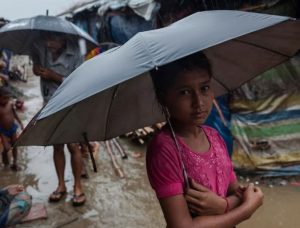Rohingya refugees face abuse from police – report
Bangladeshi police have been accused of arbitrary arrests, extortion and harassment of Rohingya refugees sheltering in camps in the country.
The NGO Human Rights Watch (HRW) says it has uncovered evidence of police abuse of Rohingyas who already face violence and intimidation from armed gangs.
HRW says a police unit called Armed Police Battalion is responsible for the mistreatment and has called on donor governments to pressure Bangladesh authorities to investigate the alleged abuses at the Cox’s Bazar camp.
“Bangladesh authorities should ensure that victims have effective remedies, and develop measures to better protect refugees,” HRW said.
The Armed Police Battalion assumed security in the Rohingya camps in July 2020.
Since then, refugees and humanitarian workers have reported that safety has deteriorated under the unit’s watch due to increased police abuses as well as criminal activity.
Some refugees have claimed there is collusion between police and armed groups and gangs operating in the camps. HRW researcher Shayna Bauchner told media: “Abuses by police in the Cox’s Bazar camps have left Rohingya refugees suffering at the hands of the very forces who are supposed to protect them”.
HRW researcher Shayna Bauchner told media: “Abuses by police in the Cox’s Bazar camps have left Rohingya refugees suffering at the hands of the very forces who are supposed to protect them”.
“Bangladesh authorities should immediately investigate allegations of widespread extortion and wrongful detention by Armed Police Battalion officers and hold all those responsible to account,” Ms Bauchner said.
HRW researchers interviewed almost 50 Rohingya refugees late last year reviewed police reports, documenting more than 16 cases of serious abuse by police.
These included abuses against ten refugees who were detained on apparently fabricated grounds for trafficking an illegal drug, or for violence-related offenses.
The report says police were demanding 10,000-40,000 taka ($US100-400) to avoid arrest, and 50,000-100,000 taka ($US500-1,000) for the release of a detained family member.
Families often had to sell jewellery or borrow money for bribes or legal costs.
The HRW report said some refugees were targeted for sharing information online about police harassment of Rohingyas.
It included an account of a man who works as a health volunteer with an international organisation and as a citizen journalist.
In July last year at about 10pm one evening, about 30 police arrived at his house, handcuffed him, and confiscated his laptop and flash drive.
He was told him he was being arrested for posting on social media about an officer harassing innocent Rohingya.
The police took him to their camp and demanded a bribe. When his family could not pay 50,000 taka ($500), the officers forcibly photographed him with drugs and sent him to the nearby Ukhiya police station.
Humanitarian organisations employ many Rohingya as aid workers or teachers.
They have raised concerns regarding the impact of the police harassment on their staff and operations.
The police harassment has heightened fear and vulnerability among the one million Rohingya refugees in Bangladesh, the majority of whom fled military repression and genocide in Myanmar in 2017.
The police abuses follow increasingly onerous and coercive restrictions on livelihoods, movement and education in the camps which has seen more checkpoints and the closure of community schools and markets.
HRW also reports that the Rohingya have faced increasing threats from the growing presence of armed groups and gangs.
The group said Bangladesh authorities should develop and carry out a rights-respecting security policy, in consultation with refugees, to protect the camp population.
“This should include providing comprehensive access to education and livelihoods to reduce illegal and dangerous economic activity,” it said.
The 2022 Joint Response Plan for the Rohingya humanitarian crisis received less than half of the US$881 million needed for the year.
“The US, UK, and other donors should support projects to promote Rohingya refugees’ safety and protection, while pressing the Bangladesh authorities to end police abuses in the camps,” Ms Bauchner said.
“Bangladesh should do what Myanmar never has – hold those responsible for abuses against Rohingya to account,” she said.
Meanwhile, International Organisation for Migration (IOM) has reported that the number of Rohingya refugees arriving in South-East Asia via sea and land routes has increased exponentially in recent months.
IOM recorded almost 3,300 arrivals in Indonesia, Malaysia and Thailand in 2022, marking roughly a 290 per cent increase compared to around 850 arrivals in 2021.












